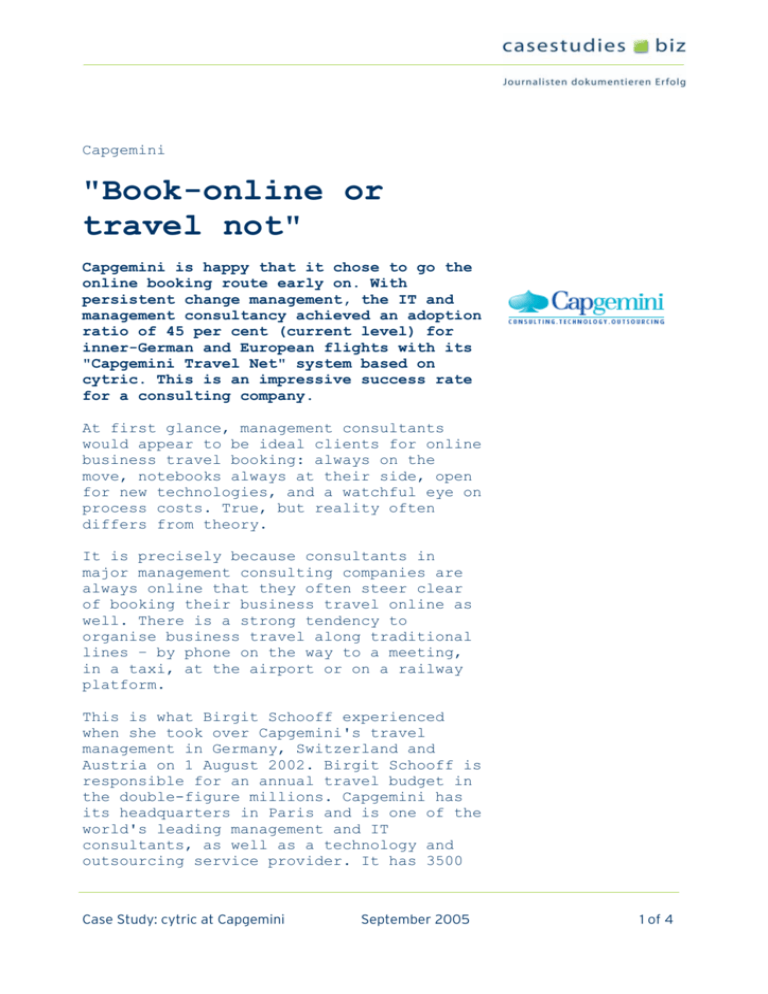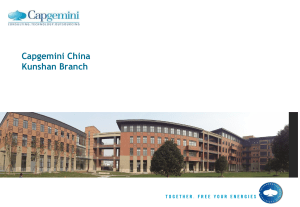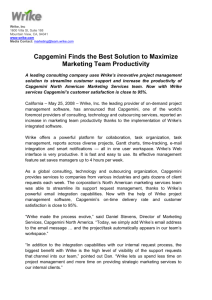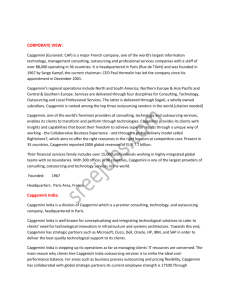Capgemini: Book-online or travel not
advertisement

Capgemini "Book-online or travel not" Capgemini is happy that it chose to go the online booking route early on. With persistent change management, the IT and management consultancy achieved an adoption ratio of 45 per cent (current level) for inner-German and European flights with its "Capgemini Travel Net" system based on cytric. This is an impressive success rate for a consulting company. At first glance, management consultants would appear to be ideal clients for online business travel booking: always on the move, notebooks always at their side, open for new technologies, and a watchful eye on process costs. True, but reality often differs from theory. It is precisely because consultants in major management consulting companies are always online that they often steer clear of booking their business travel online as well. There is a strong tendency to organise business travel along traditional lines – by phone on the way to a meeting, in a taxi, at the airport or on a railway platform. This is what Birgit Schooff experienced when she took over Capgemini's travel management in Germany, Switzerland and Austria on 1 August 2002. Birgit Schooff is responsible for an annual travel budget in the double-figure millions. Capgemini has its headquarters in Paris and is one of the world's leading management and IT consultants, as well as a technology and outsourcing service provider. It has 3500 Case Study: cytric at Capgemini September 2005 1 of 4 employees in Central Europe and is expanding strongly – and currently looking for 400 new consultants in Germany alone. At the beginning of 2002, Capgemini chose to go the online booking route using cytric from the Frankfurt software house i:FAO. Together with the external consultant Jürgen Martin (CTC Corporate Travel Consulting) the choice went cytric's way "because it is the best system currently available in Germany," says Birgit Schooff. When she joined Capgemini in summer 2002, cytric had just been technically installed. The first task was therefore to make users familiar with the new system. "It was a tough assignment," she says recalling the implementation phase for the service company which has its German headquarters in Berlin. The individual consultants did not think that there was any particular urgency in using the tool: they thought the potential savings in process costs were too low, and using the tool was too timeconsuming. The online ratio for innerGerman and inner-European flights at the time was therefore only 20 to 25 per cent. But Birgit Schooff persisted. She launched "1000 internal marketing campaigns" ranging from posters to e-mail advertisements and flyers. The aim was to convince staff of the value of the new business travel organisation process. To do so, Birgit Schooff took personal responsibility for first-level support and was available to answer all questions concerning online booking. "Having a personal contact inhouse is of great value," she says. The breakthrough came in 2004 when airlines cancelled their commissions and travel agencies countered by charging their own fees. The advantages of online booking were now obvious: the transaction fee for Case Study: cytric at Capgemini September 2005 2 of 4 Capgemini online is only a third of the off-line booking fee. This has won over more and more travellers ever since. Already by the end of 2004, only a few months after the introduction of travel agency fees, Capgemini reached an online adoption ratio of 40 per cent. This rose to 45 per cent by the middle of 2005. "This is a very high ratio given the uphill struggle in persuading this particular target group," says the travel manager. But she is convinced that the proportion will increase further. "The attitude of my colleagues is changing," she says. Young consultants joining Capgemini already book their travel online as a matter of course. The company's preferred choice is pointed out to them during their official welcome on joining the company. A witty colleague from Hessen put it succinctly in his own local dialect as follows: "Buch'onlein oder träwell net." Which roughly translated means book online or travel not. The travel manager was only really happy with cytric version v7 from September 2004. "The earlier versions of the system had a few teething problems” – the error messages and shut-downs even put off those who were quite willing to book online. "It is very difficult to establish a system in a company if it is not fully functional." The change management effort is now fairly low. The support partner Birgit Schooff now only receives one inquiry per week from members of staff. "Much less than before." Change management proves to be rather difficult when there are no travel arrangers, and every traveller has to do their bookings themselves – the situation at Capgemini. The fact that the change process is easier when there are travel arrangers is demonstrated by Capgemini in Case Study: cytric at Capgemini September 2005 3 of 4 Austria. Here, four members of staff book travel using cytric from American Express. The online adoption rate (flights) in Austria is 75 per cent. The Swiss Capgemini staff use the German travel net and contact their travel agency partner TQ3 by telephone just like their German colleagues. The travel arrangers at the Capgemini subsidiary sd&m in Munich achieved an online ratio of 75 per cent. cytric here was made available by Deutsche Reisebüro. Birgit Schooff is optimistic that Capgemini will also eventually reach similar ratios: "Ticket-less flying with Etix also took two years to establish itself – today it is taken for granted." Capgemini benefits from the fact that it began online booking early on. "I am very glad that we did not wait until 2004 before launching online booking." Contact: i:FAO Group Clemensstrasse 9 60487 Frankfurt am Main Germany Telephone +49 (69) 7680-5500 Fax +49 (69) 7680-5555 eMail info@ifao.net www.cytric.info Case Study: cytric at Capgemini September 2005 4 of 4







